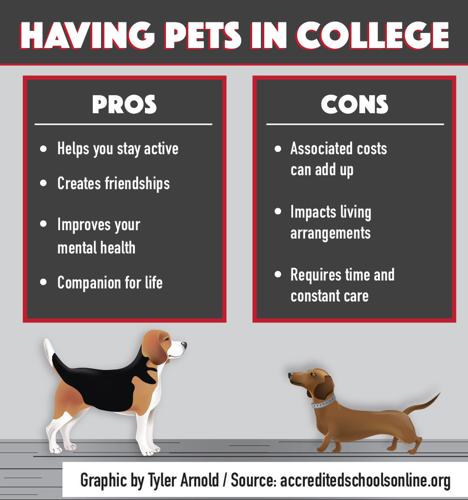Pros and Cons of Dog Boarding: Is It Worth It?
Last Updated on May 7, 2024 by Petpalace54
The pros and cons of a dog boarding business are varied, with controlled and secure environments being a benefit, while a lack of flexibility and potential stress for animals serving as drawbacks. Boarding facilities present a solution for pet owners who want their animals to be cared for without disrupting their own schedules.
Want to know the Pros and Cons of Dog Boarding? The Pros include a controlled environment and experienced staff, while one of the cons includes potential stress brought on by being in a new environment. Pet boarding also has its fair share of risk if not handled correctly. Overcrowding can be another major issue, which can lead to illnesses and infections, compromising the health and safety of the pets in the facility.
However, with proper management, running a dog boarding business can be profitable and rewarding.

Credit: www.safarivet.com
Table of Contents
Pros Of Dog Boarding
When it comes to the pros of dog boarding, it provides a controlled and secure environment for your pet, with experienced staff to ensure their safety and well-being. It also offers your dog an opportunity to socialize with other dogs, which can be beneficial for their mental health.
Pros of Dog Boarding
Are you considering starting a dog boarding business or sending your furry friend to a boarding facility? There are several benefits to dog boarding that you should be aware of. Here are some pros of dog boarding:
Safety For Dogs
One of the primary benefits of dog boarding is that it provides a safe and secure environment for dogs. Boarding facilities have trained professionals who ensure the safety & well-being of dogs. They have strict rules and regulations that must be followed to minimize the risk of injury or illness. Moreover, boarding facilities have proper equipment and tools to handle emergencies.
Professional Care
Boarding facilities provide professional care to dogs. They have trained professionals who are equipped to handle different breeds of dogs. They have a deep understanding of dog behavior and psychology. They follow strict feeding, exercise, and medication schedules to ensure that dogs are healthy and happy. In addition, they offer grooming services, such as bathing & brushing, to keep dogs clean and healthy.
Socialization Opportunities
Boarding facilities offer socialization opportunities for dogs. Dogs get a chance to interact with other dogs and people, which is important for their mental & emotional health. Socialization helps dogs to develop good behavior and communication skills. Moreover, boarding facilities offer playtime & exercise sessions, which are crucial for maintaining the health of dogs.
In conclusion, dog boarding offers many benefits for dogs and pet owners. It provides a safe and secure environment, professional care, and socialization opportunities. However, there are also some drawbacks to dog boarding that you should be aware of. We will discuss these cons in the next section.

Credit: www.alphapaws.com
Cons Of Dog Boarding
When considering the pros and cons of dog boarding, it’s important to note the potential downsides. One major drawback is that dogs may experience anxiety or nervousness in unfamiliar environments, which can lead to conflicts with other animals. Additionally, there may be limited flexibility and creativity in running a dog boarding business.
Nervousness And Anxiety In Dogs
One of the main concerns with leaving your furry best friend at a dog boarding facility is how they may handle the separation from you & being in a new environment. Dogs are creatures of habit that thrive on routine and their surroundings. Being shuffled into a new space and placed in a care setting with unfamiliar dogs around can easily cause nervousness and anxiety. This can lead to behavioral changes such as agitation, not eating, or even aggression towards other dogs.
Exposure To Illnesses
When you board your dog at a kennel, you are exposing it to various environmental factors that make it more susceptible to getting sick. Although facilities try their best to maintain cleanliness and maintain high levels of hygiene, your dog may still come into contact with a contagious virus, disease, or bacteria. This puts your pet at risk of catching illnesses such as kennel cough, which can be contracted from constant exposure to other dogs in a boarding facility.
Lack Of Personalized Care
Another significant disadvantage of a dog boarding business is the lack of personalized care. Unlike hiring a pet sitter or dog walker, where a person comes to your home to provide individualized care and attention to your pet, a kennel may not be able to provide that level of consideration. A boarding facility is a place to house a large number of dogs in one area. They may not have the time or resources to provide individual attention & care to each dog, leaving your pet feeling lonely, neglected, and unimportant.
In summary, although there are benefits to using a dog boarding business, there are also risks and drawbacks that need to be considered before making your decision. Dogs can experience nervousness and anxiety due to the new environment, may be exposed to illnesses, & may lack the personalized care they would receive at home. Always research and choose a reputable facility with trained staff to ensure your pet’s safety and happiness during their stay.
Costs Of Dog Boarding
Dog boarding can be convenient for pet owners who need to travel, but it also has its drawbacks. One major disadvantage is that pets may become anxious in unfamiliar surroundings & be at risk of altercations with other animals. However, if operated well, dog boarding businesses can be profitable.
One of the most important things to consider when choosing a dog boarding business is the cost. In this section, we’ll discuss the factors that influence the cost of dog boarding, as well as the average cost per day.
Factors That Influence The Cost
There are several factors that can influence the cost of dog boarding. One of the biggest factors is location. The cost of boarding your dog in a big city like New York or Los Angeles is likely to be much higher than the cost of boarding your dog in a smaller town.
The amenities offered by the boarding facility can also impact the cost. If a facility offers luxury suites or additional services like grooming and training, expect to pay more. The length of stay is another important factor. Most boarding facilities charge per night, so a longer stay will result in a higher cost.
Average Cost For Dog Boarding
The average cost per day for dog boarding is usually between $25 and $45 per night. However, this can vary depending on the factors listed above. Some luxury boarding facilities charge as much as $75 per night, while budget options may be as low as $15 per night.
It’s important to note that additional services like grooming or training can add to the cost. It’s always a good idea to compare prices and amenities at several different facilities to find one that fits your budget & your dog’s needs.
In conclusion, the cost of dog boarding can vary widely depending on factors like location, length of stay, and amenities offered. It’s important to do your research and compare prices at several different facilities to find the best option for you & your furry friend.
Alternatives To Dog Boarding
If you’re hesitant to leave your dog at a boarding facility, there are alternatives available. Pros and Cons of Dog Boarding: Is It Worth It? While dog boarding can provide a controlled environment, some dogs become anxious in new environments and may experience behavioral changes. Consider options like pet sitting or dog daycares instead.
Alternatives to Dog Boarding
Dog boarding is a popular option for pet owners who are going on vacations, work trips, or any other kind of travel. However, there are some downsides to this approach. If you’re not comfortable with leaving your furry friend in an unfamiliar place, or if your dog is not comfortable with change, then dog boarding may not be the best solution for you. But there are alternatives to consider. Here are some options to consider if you’re looking for an alternative to dog boarding:
Pet Sitting
Pet sitting is a popular alternative to dog boarding. With this option, someone comes to your home to take care of your pet while you’re away. This way, your pet can stay in familiar surroundings, providing them with comfort & peace of mind.
Dog Walking Services
Dog walking services are another alternative to dog boarding. With this option, a professional dog walker comes to your house to exercise & walk your dog. This is an excellent option if your dog requires daily exercise or if you’re only going to be away for a short period of time.
In-home Care
In-home care is another alternative to traditional dog boarding. Instead of taking your pet to a facility, pet sitters come to your home to take care of your pet. This way, your dog can stay in their comfort zone and enjoy the same routines they’re used to at home.
There are several alternatives to dog boarding that you can consider for your pet. Each option has its pros and cons, and you should weigh them carefully before making a decision. Pet sitting, dog walking services, and in-home care are all great options for pet owners who want to provide their furry friends with the best possible care while they’re away.
Factors To Consider
Operating a dog boarding business can be a rewarding venture, but there are pros and cons to consider. On the positive side, a well-run kennel can provide safe, secure, and supervised care for dogs when their owners are away. However, some dogs may experience anxiety or behavioral changes while staying at a boarding facility.
Factors to consider when it comes to the pros and cons of dog boarding businesses include the dog’s personality and needs, the length of time away from home, and the boarding facility’s reputation. Taking these factors into account can help ensure that both pet owners and their furry friends have a positive experience.
Dog’s Personality & Needs
Before boarding a dog, it’s important to consider their personality & individual needs. Some dogs may be too anxious or nervous to handle the stress of a boarding environment, while others may thrive in the company of other dogs and new people. It’s essential to choose a boarding facility that caters to the specific needs of the dog, taking into account their age, breed, and personality.
Length of Time Away from Home
The length of time a dog is away from home is also a critical consideration when choosing to board a pet. For shorter trips, it may be possible to leave the dog at a friend or family member’s home or have a pet sitter check in on them during the day. For longer travel plans, a boarding facility may be a better option. However, pet owners should ensure that the dog boarding business allows them to stay for an extended period & provides a comfortable and safe environment.
Boarding Facility’s Reputation
A third critical factor to consider is the boarding facility’s reputation. Pet owners should research local options, read reviews and testimonials, & perhaps even visit the location in person before making the decision to board their pet. A good boarding facility should have experienced staff, proper cleaning and sanitation practices, & a welcoming environment for pets.
In conclusion, pet owners must weigh the pros and cons of dog boarding carefully before leaving their precious fluffy friend in the care of a boarding facility. By considering factors such as the dog’s personality & individual needs, the length of time away from home, and the boarding facility’s reputation, pet owners can ensure a positive experience for their furry friend.

Credit: www.newvictorianinn.com
Tips For Choosing A Boarding Facility
Choosing a boarding facility for your furry friend can be a difficult decision. Understanding the pros and cons of a dog boarding business can help you make the right choice. While kennels offer a controlled environment, some pets may experience anxiety and behavioral changes associated with feelings of abandonment.
Meanwhile, owning a boarding facility takes patience and dedication.
Inspect The Facility
Before boarding your dog at a facility, it’s important to conduct a thorough inspection. Visit the facility in person, taking note of its cleanliness, safety measures, & overall atmosphere. Look for signs of adequate ventilation, appropriate lighting, and secure fencing. Check if they have proper ventilation systems, like fans or air conditioning, particularly in areas where dogs sleep. Observe how the current occupants behave in play areas & ensure that the facility follows the regulations set forth by the government. Lastly, your goal is to find a facility that will provide your dog with a safe & comfortable environment.
Ask For References
It’s always a good idea to ask for references before signing up for boarding services. Contact past clients & inquire about their experiences with the facility. Ask if their pets were well-cared for, if they returned from their trip healthy and happy, & if any issues arose during their stay. Don’t hesitate to ask for a list of references and take the time to call and speak with each one.
Read Reviews Online
In addition to asking for references, it’s also essential to read reviews online. Check websites such as Yelp, Google, or Facebook to see what others have to say about the facility. Look for reviews that mention factors such as cleanliness, staff behavior, and communication. Keep in mind that while negative reviews are a red flag, a positive review is not necessarily a guarantee of quality services. Therefore, read multiple reviews to get the bigger picture.
In conclusion, when selecting a boarding facility for your furry friend, it’s crucial to keep these three tips in mind. Always inspect the facility, ask for references, & read reviews online to ensure your dog has a great stay in a safe and healthy environment.
Frequently Asked Questions For Pros And Cons Of Dog Boarding Business
How Profitable Is A Dog Boarding Business?
Owning a dog boarding business can be profitable, but there are pros and cons to consider. The primary benefit is repeat customers and a secure environment for dogs. The downside is that some dogs may become anxious in a new environment.
Additionally, there may be limited room for creativity and flexibility in running the business. Overall, profits can be earned, but proper research & planning are necessary.
What Are The Disadvantages Of Pet Boarding?
The disadvantages of pet boarding include pets being away from their home, which can lead to nervousness and altercations with other animals. Traditional kennels can cause undue anxiety, physical issues, & behavioral changes. There is also less room for creativity and flexibility in a dog daycare franchise.
Some pets may experience increased stress and anxiety while staying at a boarding facility.
What Is The Downside Of Kennels?
The downside of kennels is that dogs may experience anxiety, physical issues, and behavioral changes when left in a traditional kennel. Some pets also become nervous or anxious in new environments, which could lead to altercations with other animals at playtime.
Furthermore, owning a kennel franchise may not be flexible or creative.
Is A Doggie Daycare A Good Investment?
Owning a doggie daycare franchise can be a profitable investment, but it requires hard work, patience, and dedication. However, there is limited room for creativity and flexibility in owning a franchise. Additionally, some pets may become nervous or anxious in new environments while boarding, leading to altercations with other animals.
Careful consideration is necessary before investing.
Conclusion
Owning a dog boarding business has its pros and cons, as with any business. What are the Pros and Cons of Dog Boarding? It offers the opportunity for repeat customers & can be financially rewarding, but there may be limited creativity and flexibility. Pet owners should carefully consider the impact boarding may have on their furry friends and choose a reputable, secure facility.
Ultimately, it is important to weigh the pros and cons before making a decision to start a dog boarding business.





